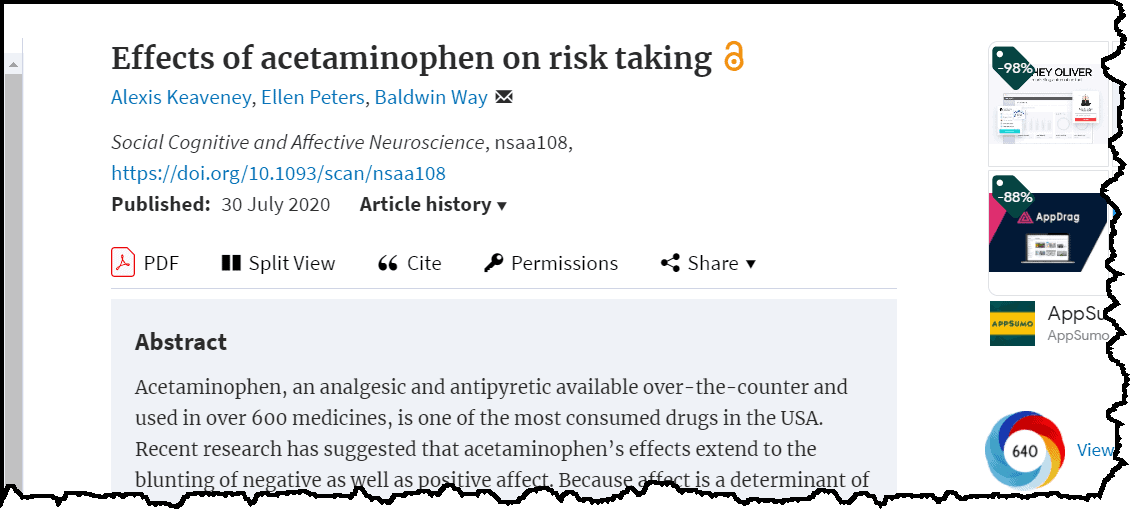
This restores that teenage pleasure by stimulating the nerves…
Unsubscribe | Report as spam | Change email preferences
—-Important Message—-
3 solo activities that rewire the brain for more pleasure
There’s a brain-penile connection in men that can be broken…
And when it’s broken, the member stops receiving “get rocky” signals from the brain…
The result? Poor rockiness, less lasting power, less pleasure.
So most men with erections problems are suffering from a broken brain-penile connection without even realizing it.
Fortunately, it’s easy to restore this connection with a simple rewiring method…
…3 simple solo activities that naturally rewire the brain-penile connection, making it stronger than ever…
And the result is much better rockiness, 30-minute lasting power, and more pleasure than you’ve felt in years.
Here are the 3 solo activities
———-
Risky behaviors from this 1 over the counter remedy?
One of the most popular treatments in the U.S. – acetaminophen – has a strange side effect that almost no one knows about.
It changes how people view risk.The most popular brand name of acetaminophen is Tylenol, but it can be found in over 600 different treatments – many over the counter.
So you need to read the labels to see if the treatment you are taking contains acetaminophen. This side effect is a weird one.
Usually, when you think of treatment side effects, you think of effects on your body – not on your behavior.
But this treatment can make you more likely to engage in risk-taking behavior.
Recent research has pointed to acetaminophen as blunting people’s perception of risk.
Researchers tested this hypothesis by giving acetaminophen (1,000mg) to some subjects and a placebo to others.
The 1000mg dose is one that people frequently take to treat pain or headaches. That’s why they used it in the study.
Because affect is a determinant of risk perception and risk taking, we tested the hypothesis that acute acetaminophen consumption (1000 mg) could influence these important judgments and decisions. In three double-blind, placebo-controlled studies, healthy young adults completed a laboratory measure of risk taking (Balloon Analog Risk Task) and in Studies 1 and 2 completed self-report measures of risk perception.
After taking the treatments, the people in the study answered a survey about risk-taking behaviors.People on acetaminophen were less frightened on questions ranging from bungee jumping to walking home through a dangerous neighborhood.
Other parts of the study had subjects blowing up a balloon on a computer screen.
The people on acetaminophen were more willing to make it pop than those who had been given the placebo.Every single part of the study pointed to the same conclusion.
Risk-taking behaviors increased with NORMAL doses of acetaminophen.
Across all studies (total n = 545), acetaminophen increased risk-taking behavior. On the more effectively stimulating risk perception measure used in Study 2, acetaminophen reduced self-reported perceived risk and this reduction statistically mediated increased risk-taking behavior.
This is crazy for a treatment that’s super common.
Nearly 1 in 4 people in the United States takes this once a week.Patients in the hospital get acetaminophen all the time.
Does this make them agree to more risky procedures?What about driving? Might acetaminophen influence you to go through the yellow instead of stopping?We don’t really know the answers to these things.But it always AMAZES me how little we know about the effects of even common treatments that have been around for a long time.
These results indicate that acetaminophen can increase risk taking, which may be due to reductions in risk perceptions, particularly those that are highly affect laden.
I’m not saying that all treatments are bad, or that sometimes they aren’t necessary.
But I think if most people realized the extent of these treatments’ influence on our bodies…
…and not only in the ways they are advertised…
Then people would take fewer of them.
I personally don’t think Big Pharma WANTS you to know how bad their treatments can be for your body…
And how much they can influence not only your long-term health, but also your cognitive state.
While you shouldn’t go off of treatments without consulting with a doctor (it can be dangerous in some cases)…
…you should also use caution when going on treatments.Know the risks and know the rewards and decide if it’s worth it to you.
—-Important Message—-
1 secret to living to 120
I’ve discovered a hidden group of men living in remote corners of the world who are living well past 100, even 115 and 120…
…and having great physical intimacy…
These men often smoke all day, eat what they want, drink what they want…
And no, they are not genetically gifted…when these men move to the typical Western country, they stop living long lives.
This proves their long life and virility has everything to do with lifestyle — NOT genetics.
And the most striking thing is — these men are having congress with their wives everyday or every other day — and they’re over 100 years old!
And you know how these men are able to perform past 100 and enjoy great health?
These men are living over 100 by doing something nobody else is doing…
———-




